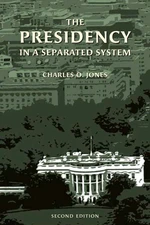Popular interpretations of American government tend to center on the presidency. Successes and failures of government are often attributed to presidents themselves. But, though the White House stands as a powerful symbol of government, the United States has a separated system intentionally designed to distribute power, not to concentrate it. Charles O. Jones explains that focusing exclusively on the presidency can lead to a seriously distorted picture of how the national government works. The role of the president varies widely, depending on his resources, advantages, and strategic position. Public expectations often far exceed the president's personal, political, institutional, or constitutional capacities for achievement. Jones explores how presidents find their place in the permanent government and how they are "fitted in" by others, most notably those on Capitol Hill. This book shows how a separated system of government works under the circumstances created by the Constitution and encouraged by a two-party system. Jones examines the organizational challenges facing presidents, their public standing and what it means, presidential agendas and mandates, and lawmakinghow it works, where the president fits in, and how it varies from issue to issue. He compares the post-World War II presidents and identifies the strengths and weaknesses of each in working within the separated system. Jones proposes a view of government as a legitimate, even productive, form of decisionmaking and emphasizes the varying strategies available to presidents for governing. He concludes with a number of important lessons for presidents and advice on how to make the separated system work better.
Price history
Nov 9, 2022
€20.15

